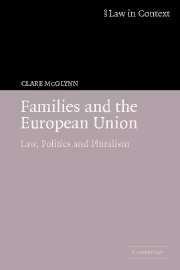Book contents
- Frontmatter
- Contents
- Preface
- Acknowledgments
- Table of cases
- Table of legislation and documents
- 1 Pluralism and human rights: a legal foundation for the regulation of families and family law in the European Union
- 2 Families, ideologies and value pluralism: towards an expanded concept of family
- 3 Children and European Union law: instrumentalism, protection and empowerment
- 4 Parenthood and European Union law: old ideologies and new ideals
- 5 European Union law and the regulation of intimate relationships: marriage, partnerships and human rights
- 6 The emergence of a European Union family law
- 7 Harmonisation, codification and the future of family law in the European Union
- Bibliography
- Index
Preface
Published online by Cambridge University Press: 04 July 2009
- Frontmatter
- Contents
- Preface
- Acknowledgments
- Table of cases
- Table of legislation and documents
- 1 Pluralism and human rights: a legal foundation for the regulation of families and family law in the European Union
- 2 Families, ideologies and value pluralism: towards an expanded concept of family
- 3 Children and European Union law: instrumentalism, protection and empowerment
- 4 Parenthood and European Union law: old ideologies and new ideals
- 5 European Union law and the regulation of intimate relationships: marriage, partnerships and human rights
- 6 The emergence of a European Union family law
- 7 Harmonisation, codification and the future of family law in the European Union
- Bibliography
- Index
Summary
When this book was first conceived, my aim was to analyse the concept of family employed in a number of different areas of substantive Community law. The thought of writing a book which also included a detailed discussion of the family law of the European Union never entered my head. If it had, I should have thought it would be a very short book indeed. However, in the late 1990s, when carrying out research for an article on the developing concept of family in European Union law, I came across references to family law in discussions regarding the prospects for a European civil code. The deeper I delved, the more astonished I became. Not only was there already a Matrimonial Convention, but also a proposal to Communitarise it in the form of a regulation. I was very surprised that I had not come across this material before then. Where was the discussion of these extremely important, and potentially very controversial matters, not just in the academy but in public debates more generally? While academic scholarship has caught up with these developments, public debate remains scandalously absent. Indeed, in reality, it is only scholarship in common law countries and in the English language that has ‘caught up’; there has been a long and detailed discussion of family law harmonisation in other European jurisdictions.
When writing, then, in 1999, about the possible creation of a family law for the European Union, I feared I was being too conspiratorial in suggesting such developments.
- Type
- Chapter
- Information
- Families and the European UnionLaw, Politics and Pluralism, pp. xi - xvPublisher: Cambridge University PressPrint publication year: 2006

